Fishing is in José Mauro da Silva’s blood. He raised all five of his children and several of his 12 grandchildren on income he made from fishing the River Pomba in southeastern Brazil.
But a little over a decade ago, da Silva’s world changed when a subsidiary of major Canadian asset manager Brookfield dammed the river, creating a vast reservoir larger than London’s Heathrow airport in order to feed the nearby Barra do Braúna Hydroelectric Power Plant.
Since then da Silva and the other local fishermen, as well as farmers who relied on the waters of the Pomba to sustain their crops, have been told they can no longer use the waters of the reservoir. Large red signs posted around its banks warn off anyone who might try.
"There were a lot of fish there, and after the dam was closed, the fishermen could not catch fish anymore," da Silva told reporters by his wooden boat, on the banks of the reservoir. “It had a huge impact. People got depressed.”
The 55-year-old said Brookfield’s Brazilian subsidiary, Barra do Braúna, paid him temporary compensation for his loss of earnings after the plant was built in 2009, but the company still refuses to let fishermen use the reservoir, as it had pledged. Da Silva and his family now fish upriver where catches are lower, and the grandfather has set up a bar in his backyard to make ends meet.
“We didn’t ask for this disorder in our lives," said Juanice Oliveira, the president of a residents’ association from the nearby city of Laranjal, which estimates that some 200 families have lost their livelihoods because of the reservoir.
“My husband used to fish and he then had to look for something else to do. My brother was a sand miner, and now he has to work far away.”
Some of the residents who complained about Brookfield’s conduct surrounding the development say they have been harassed, with one now fearing for his life. In 2019 the Public Prosecutor’s Office in Minas Gerais, the state where the reservoir is located, began an investigation into how citizens were compensated over the development. Meanwhile, a second probe has been opened by state police into threats made against those who have spoken out.
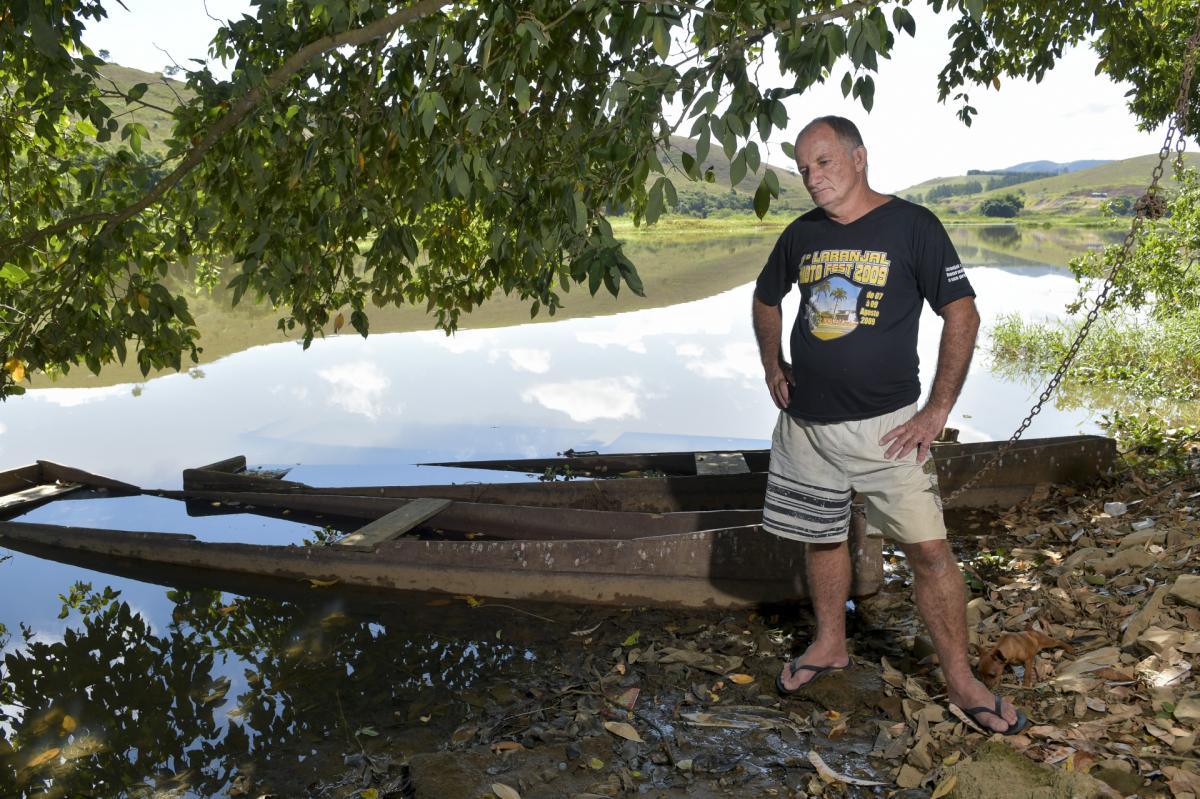 José Mauro, a fisherman from southeastern Brazil, said Brookfield’s Brazilian subsidiary has destroyed his livelihood. Photo by Washington Alves.
José Mauro, a fisherman from southeastern Brazil, said Brookfield’s Brazilian subsidiary has destroyed his livelihood. Photo by Washington Alves.
Besides the controversy surrounding the Barra do Braúna Hydroelectric Power Plant, these include a probe of the company’s alleged part in floods that deluged the eastern city of Raul Soares, and accusations of environmental damage caused by another of its hydroelectric plants in the state of Mato Grosso. Authorities are also examining a plant and a sewage station of one of Brookfield’s subsidiaries that have been operating for years without a licence.
None of the investigations are mentioned in Brookfield's annual reports, in Brazil or elsewhere.
A spokesperson for Brookfield’s Brazilian subsidiary, which changed its name to Elera Renováveis last year, denied any wrongdoing, saying the company “develops its activities based on ethics, transparency and respect for employees, society in general and the environment, always complying with the law.”
Brookfield Asset Management added: “Our renewable power operations in Brazil and Colombia operate to the highest standards.”
Brookfield, which has more than US$600 billion in assets under management worldwide, is listed on the Toronto and New York stock exchanges and led by some of the most recognized names in Canadian business, including vice chair Mark Carney, a former governor of the Bank of England, and CEO Bruce Flatt, who has an estimated net worth of $2.8 billion.
Despite the ongoing probes, the global giant has expanded rapidly in Brazil, more than doubling its assets under management in the country from 43.3 billion Brazilian reais ($13.30 billion) in 2016 to 121.3 billion reais ($23.35 billion) in 2020. Elera Renováveis is reportedly planning to build the largest solar power project in Latin America in Minas Gerais.
Brookfield’s Brazilian CEO, Henrique Carsalade Martins, has publicly attributed the company’s success to "mitigating the impact of its operations on the environment and conducting business according to the highest ethical and legal standards."
Kenza Bryan, an investigator at the environmental and human rights NGO Global Witness, said Brookfield and its leadership team “urgently need to start practicing what they preach when it comes to environmental stewardship and human rights.”
“As the COP26 climate conference approaches, Mark Carney’s credibility as a leading voice on the financial sector’s green transition and an advisor to the UK and UN risks being undermined by the serious questions Brookfield has to answer over its alleged links to abuses,” she said.
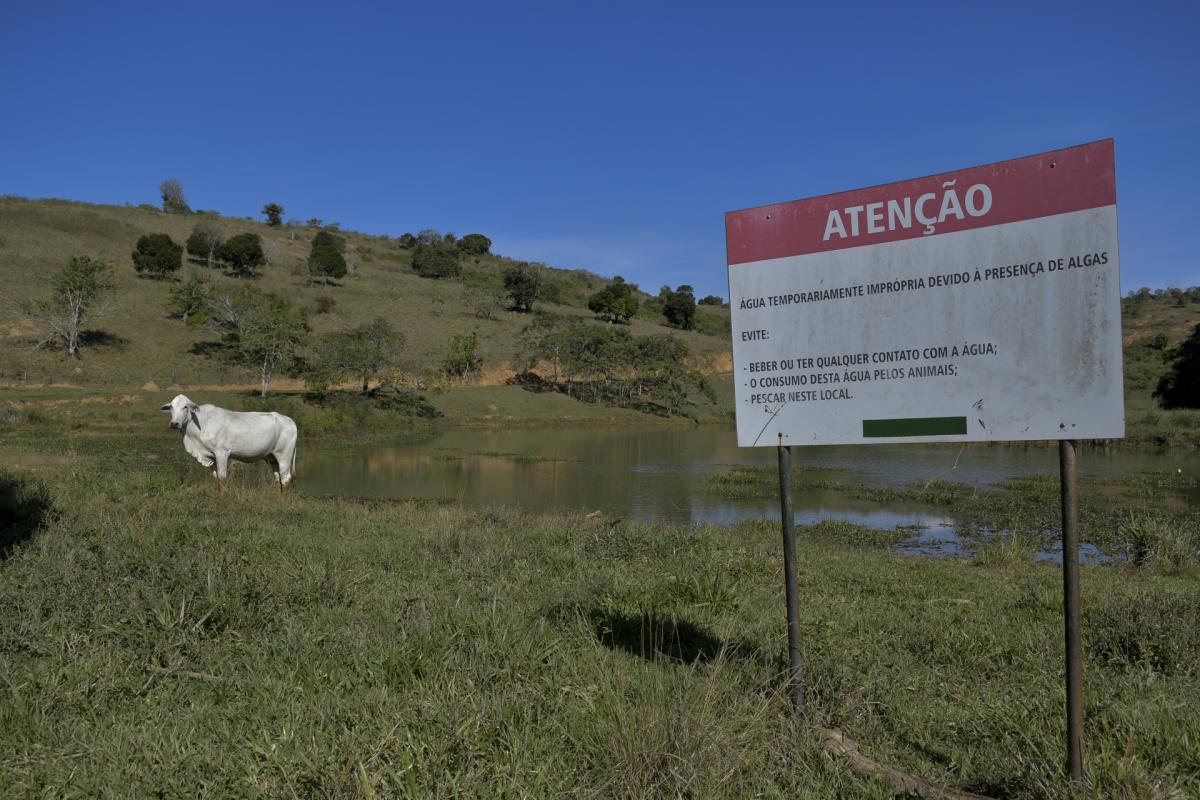 Signs warn off people from using the reservoir that feeds the Barra do Braúna Hydroelectric Power Plant. Photo by Washington Alves.
Signs warn off people from using the reservoir that feeds the Barra do Braúna Hydroelectric Power Plant. Photo by Washington Alves.
Threats Against Residents
Danilo Novaes, a former sand trader from Laranjal, has feared for his life since he demanded Brookfield do more to help people whose livelihoods had been harmed by the Barra do Braúna hydroelectric plant.
In 2017 and 2018, he and several other residents of the small city lodged a series of complaints with both Brookfield itself and with the Conselho Estadual de Assistência Social de Minas Gerais, a state agency that mediated with local people over the project.
The residents said their income fell drastically after Brookfield bought their land, and the company’s “economic reactivation” package had not provided other sources of income. Many complained they had lost their jobs and elderly people had been left unable to support themselves, according to documents provided by a local residents’ group, the Associação de Atingidos por Barra do Braúna.
Oliveira, the group’s president, said that many people, including her father, were pressured to sell their land.
"They said, ‘If you don't accept this price, you'll go to court. Then you'll be expropriated.’ So, psychologically, he was pretty shaken up." Soon, she said, “the best part of the land was underwater. There was nothing left.”
Andrea Zhouri, coordinator of the Environmental Studies and Themes Group at the Federal University of Minas Gerais, said hydroelectric plants like Barra do Braúna are often developed “in an authoritarian manner.”
“Decisions have already been taken behind closed doors between governors, banks and shareholders. The chance of saying no to such an undertaking is very small,” she said.
Brookfield’s Brazilian business, Elera Renováveis, said it had complied with all its legal obligations to help residents, including setting up two cooperatives to provide income to those affected by the plants and paying all claims where people had the necessary evidence.
“All the associations and cooperatives that represent the communities surrounding Elera's projects had their demands met under the terms of the commitments assumed by the company,” a company spokesperson said.
The Conselho Estadual de Assistência Social de Minas Gerais declined to comment, saying the allegations are still being considered.
Residents say attempts have been made to silence those who spoke out against the development.
Novaes reported to police that he received a call from people who said they were representatives of Brookfield in May 2017. Before they realized he was on the line, he overheard them saying they would “put men after them” — comments he took as a threat. Then, they told him his allegations were damaging the company’s reputation.
"If the police, the state, the prosecutors, don't prosecute anyone, I'm thinking of asking for political asylum and leaving Brazil, because the chance of me dying is high,” he told OCCRP.
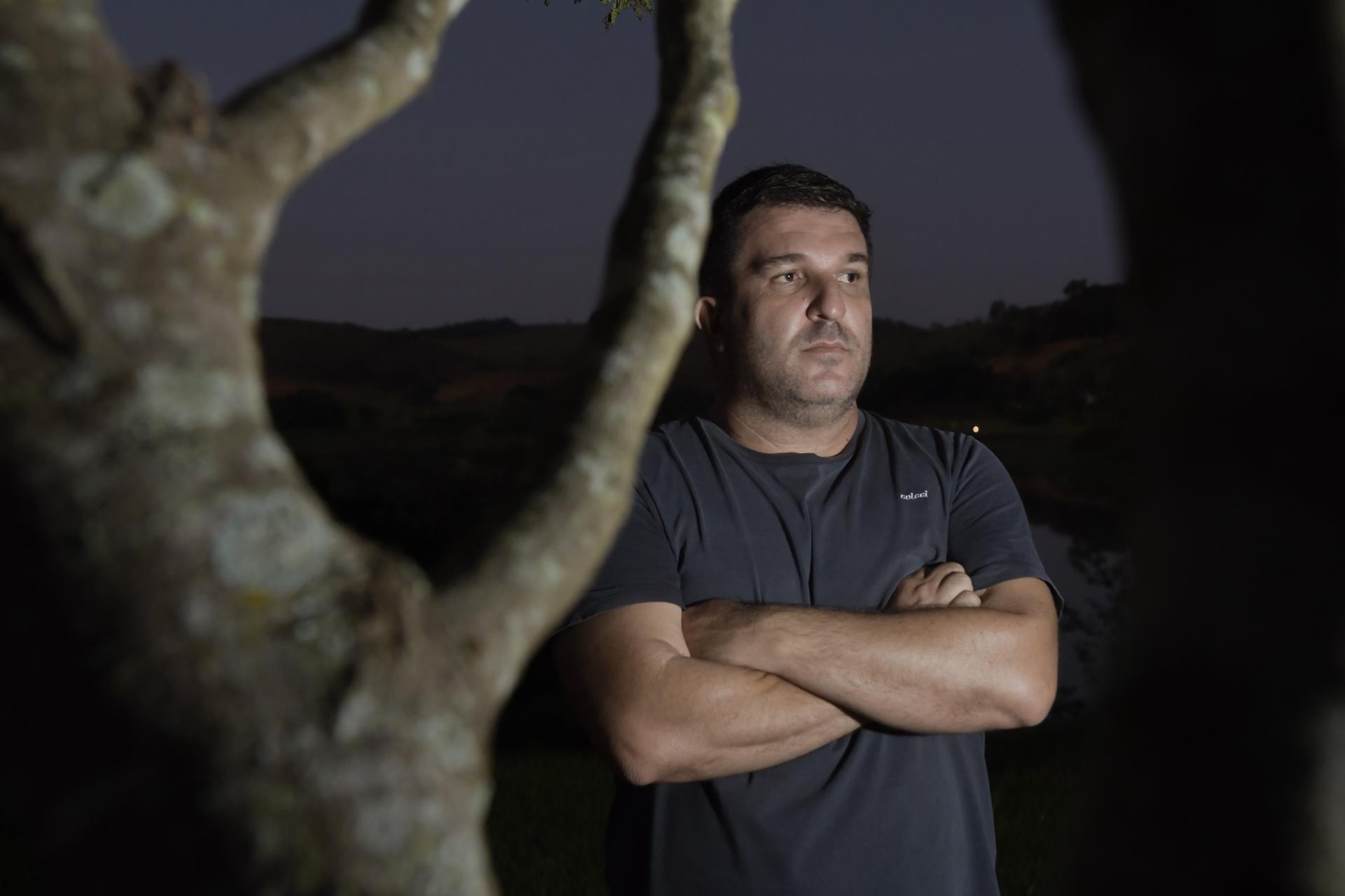 Danilo Novaes says he has feared for his life since he demanded Brookfield do more to help people whose livelihoods had been harmed by the Barra do Braúna hydroelectric plant. Photo by Washington Alves.
Danilo Novaes says he has feared for his life since he demanded Brookfield do more to help people whose livelihoods had been harmed by the Barra do Braúna hydroelectric plant. Photo by Washington Alves.
Elera Renováveis denied this call ever happened.
The following month, a man appeared and stood outside Novaes’ home for two days, scaring his family and their neighbors.
Novaes called the police, who questioned the stranger. Giving his name as Emerson, he told police he worked for the Brascan Hydroelectric Plant, the former name of Brookfield in Brazil.
Unable to establish that anything illegal had happened, the police let Emerson leave. But then in November 2018, the day before Novaes was due to criticize Brookfield at a public meeting involving those affected by the dam, another man turned up at his house and started taking pictures.
This time Novaes wasn't the only one who was worried. After the meeting, Oliveira said two men had also come to her restaurant looking for her, asking her staff questions and taking pictures, in what she told police appeared to be an attempt to scare her into ending her opposition against Brookfield.
Elera Renováveis said Novaes had filed lawsuits against the company “in order to obtain an undue financial advantage” after his claim for compensation was rejected. A spokesperson for the company denied it had ever threatened anyone, claiming that it was in fact Novaes who had made threats against the company. In court documents, the company said he adopted “harmful behavior against directors, executives and the entire staff,” sent emails demanding money, and made visits to the company’s offices.
In response to questions on whether the company also carried out surveillance on Novaes, the spokesperson said it “sought to observe his real intention to materialize the threats.”
Brazil’s Civil Police opened an investigation into the alleged threats against Novaes and Oliveira in January and August 2019, respectively. Documents from the file, seen by OCCRP and The Intercept Brasil, show officers spoke to Pablo Mandelbaum, who worked for Brookfield as an environmental analyst between 2014 to 2016.
Mandelbaum told police "he noticed several problems related to accountability” at Brookfield, including its work with an NGO that was meant to help Laranjal residents, Núcleo de Assessoria às Comunidades Atingidas por Barragens (NACAB). Mandelbaum said a man hired by NACAB to help affected residents had misappropriated money, claiming it would be used to buy rubber tree seedlings for a community project, but instead spending it on a car. (NACAB denies his allegations.)
When Mandelbaum reported the issue to Brookfield, he said he was told to “be careful as the NGO could greatly damage the company's image.” Mandelbaum told police he was transferred to another project in northern Brazil after filing the complaint, then was fired soon after.
"The company [Brookfield] gave the money [to the NGO], but without following the procedures so that this money could be used properly,” Mandelbaum said when reached for comment. “They spent a lot of money and it didn't go back to the community.”
Elera Renováveis said an audit had identified 17,000 Brazilian reais of “irregularities” in NACAB’s spending, and the NGO had stopped working on the project in 2017. Since the investigation, Brookfield has adopted stricter measures to control its investments, a spokesperson said.
“This issue had no impact on economic reactivation projects, which received the necessary resources for their complete execution,” they said.
Mandelbaum, the spokesperson added, had only worked for Brookfield on a temporary basis and stopped after finishing his one-year contract.
The police investigation has not advanced much since 2019. A press officer for the Civil Police of Minas Gerais declined to explain why the case is still open. The lead on the probe, Fábio Correia, said it had stalled because the company is not based in Minas Gerais.
“That's where the investigation comes to a halt, because the representatives of this company are not from Belo Horizonte,” he said, referring to the capital of Minas Gerais.
However, reporters have found the investigation into the threats is not the only probe into Brookfield’s operations in Minas Gerais.
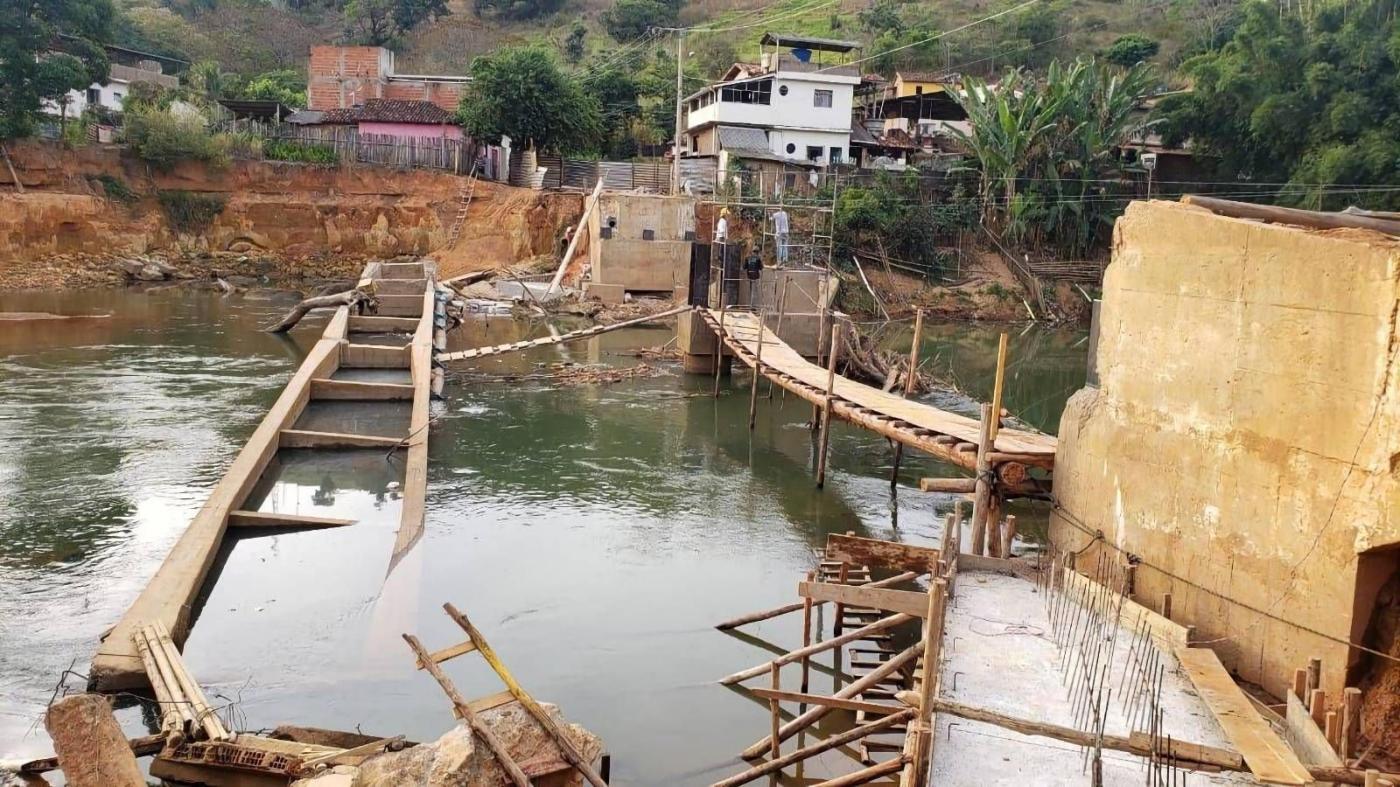 Floods inundated Raul Soares, in Minas Gerais, in January 2020 and again this year. Photo by Leonardo Augusto.
Floods inundated Raul Soares, in Minas Gerais, in January 2020 and again this year. Photo by Leonardo Augusto.
Devastating Floods
Scrawled on the outside of Washington dos Santos Silva’s former home, in Raul Soares in Minas Gerais, are the words: "I lost this house because of Brookfield Jan. 2020.”
That month a flood swept through the city, inundating houses and forcing residents to flee their homes. A bridge was destroyed as the Matipó River spilled its banks, damaging 34 homes beyond repair. A lawyer who represented Raul Soares’s city hall at a public hearing in February 2020 said the government has registered 800 houses that were affected by the floods, and at least 3,000 people had been left homeless.
Santos Silva said his son is still so traumatized that he cries whenever it rains.
The entrepreneur rented two houses that were ruined by the floods, including one where he and his family live now.
"It has snakes, spiders, and everything is infesting the neighbors. They are complaining — and with good reason,” he said.
An investigation by the Public Prosecutor’s office of Minas Gerais found Brookfield’s company Zona da Mata Geração, which owns two hydroelectric plants on the Matipó River, may have contributed to the flooding.
Prosecutors allege that one of the hydroelectric dams had released water without warning. A technical report commissioned by the office found water levels at the dam fell after the deluge, indicating it “may have contributed to the occurrence of floods in Raul Soares.”
The document also says the company failed to alert authorities in the city so that people at risk from the floodwater could be evacuated.
Brookfield denies responsibility for the flooding, arguing that January 2020 was the wettest month in Minas Gerais since records began more than a century before. Nonetheless, the company has refused to pay for an independent audit that might confirm its argument.
“The flood that occurred in 2020 was not caused by the operation of the João Camillo Penna SHP, which operates in accordance with national and international safety standards and is constantly monitored by qualified technical teams,” said a spokesperson.
“The plant is run-of-river, having a reservoir with a small useful volume, not having the capacity to regulate or control floods,” the person said, adding that the company had provided food and other supplies to residents after the floods.
When a reporter visited Raul Soares in May 2021, the bridge that had been swept away had not been fixed. Houses still bore the marks of the 2020 floods, and others that affected the area in February this year.
Geraldo Rodrigues Pereira, who has lived in Raul Soares for close to four decades, pointed to the watermark this year’s flood had left on the walls of his grocery store. Rodrigues, in his early 60s, survived by taking refuge in the apartment above the shop, where he had been living after his home was destroyed.
"I lost almost everything I have,” he said.
A public hearing to let residents air their grievances to the company and the government was held in February 2020, but since then the case has stalled.
Prosecutor Pedro Henrique Rodrigues Alvim said his office plans to file a lawsuit to force Brookfield to present a contingency plan, though he said that until now the company has not cooperated.
"There is great difficulty in accessing the company,” he said. “The impression I get is that those who work in the dams are not the people of Raul Soares. There is no link between people. Their lawyers are from Rio de Janeiro.”
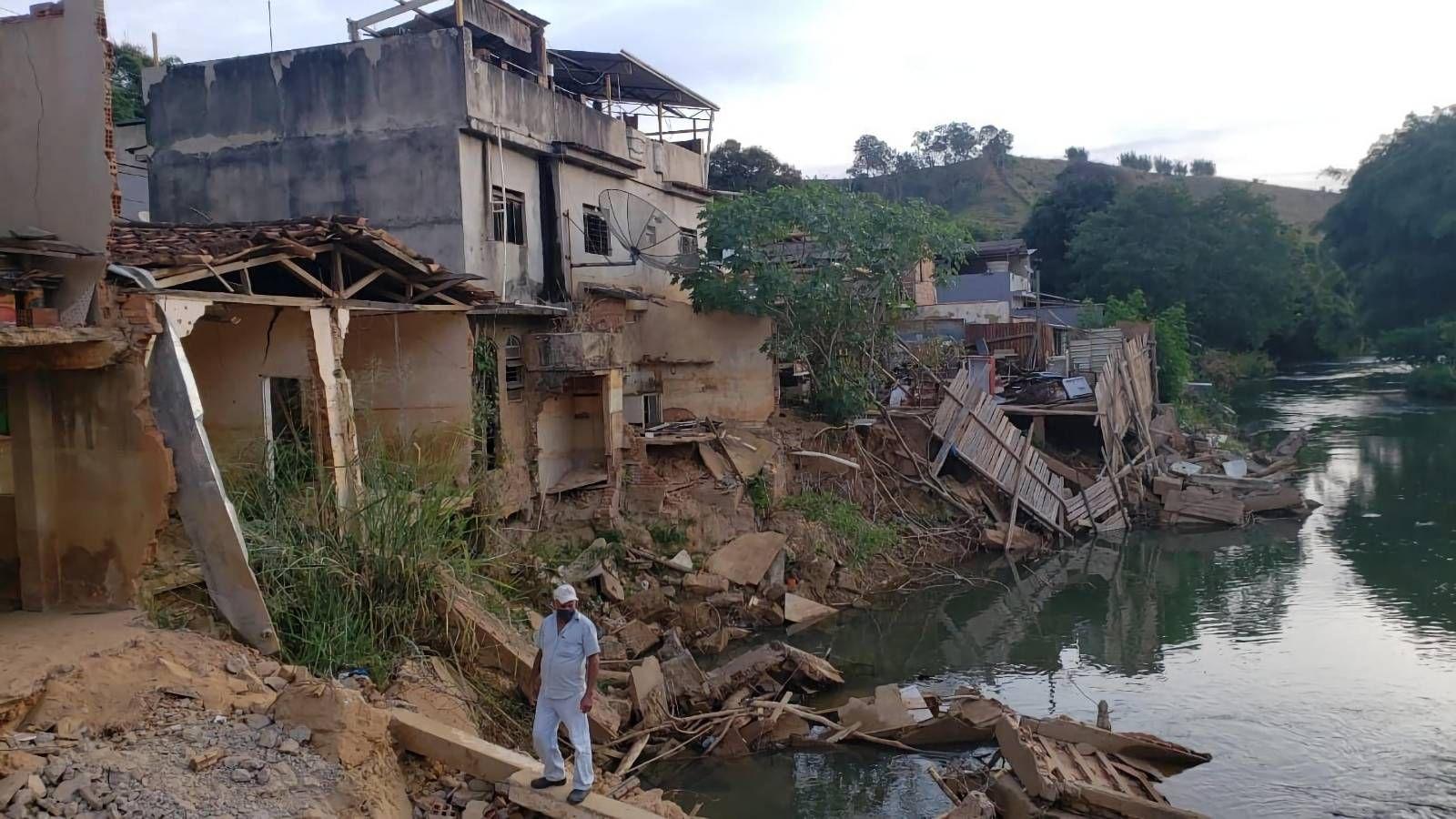 Prosecutors allege that one of Brookfield’s hydroelectric dams released water without warning in January 2020, which swept through Raul Soares. Brookfield denies it was responsible for the floods. Photo by Leonardo Augusto.
Prosecutors allege that one of Brookfield’s hydroelectric dams released water without warning in January 2020, which swept through Raul Soares. Brookfield denies it was responsible for the floods. Photo by Leonardo Augusto.
Operating Without a License
The hydroelectric plant believed to have caused the Raul Soares floods may soon be shut down.
Prosecutor Pedro Henrique Rodrigues Alvim said the floods had accelerated a civil action brought against the João Camilo Pena hydroelectric plant, which has been operating without an environmental license since at least 2008, the year after Brookfield acquired it from Cataguazes-Leopoldina.
Prosecutors lodged a lawsuit against the plant in May 2020, warning it could be shut down.
“Hydroelectric dams … may lead to adverse changes in the soil and its abilities, water bodies and its hydrological regime, climate, natural ecosystems, fauna and flora, as well as the quality of life of the populations,” say the court documents.
“It is essential that they are subject to the control and inspection of the competent environmental agency, which is effected by means of environmental licensing," it goes on, warning that the plant may be banned from operating.
A sewage treatment station in the district of Bicuiba, owned by Brookfield company Zona da Mata Geração, is also being prosecuted, after a 2019 inspection revealed it was built in an environmental preservation area without authorization.
Brookfield said that after the hydropower plant’s operating license expired it signed a Term of Environmental Commitment with the regional environmental authority, which has allowed the plant to operate since 2011 while it is in the process of obtaining a new environmental license.
In Bicuiba, Brookfield said an agreement to transfer the facility to the municipality was signed in 2018, but the environmental licensing process has been stalled since then due to disputes between the local City Hall and the state environmental administration.
A spokesperson for the Minas Gerais state government said the license was “under analysis,” but didn’t respond to questions on why the company had been allowed to operate for a decade without one.
Further afield, in the state of Mato Grosso, public prosecutors last year also filed a civil action against another company in the Brookfield group, Itiquira Energética SA, blaming it for killing fish by varying water levels at a hydroelectric plant it operates.
A report by the the State Department of Environment, which went to inspect the area in December 2018 after residents sent in pictures of dead fish in the river near the plant, estimated the cost to the environment at 148.9 million Brazilian reais ($29.1 million).
The deaths of the fish are "directly related to the activities of this project (ie, the hydroelectric plant), so it should be responsible for the environmental and moral damage caused," they concluded, imposing a fine of 2.5 million reais (just under $490,000).
Prosecutors are now pushing for Itiquira Energética to pay for the environmental damage caused by the plant along with the fine, which will be used to fund environmental projects.
Itiquira Energética disputed these findings, saying the reports did not adequately establish a direct relationship between the plant’s operations and the deaths of the fish and blaming illegal fishing groups. The case is still ongoing.
Daniela Castro contributed reporting






